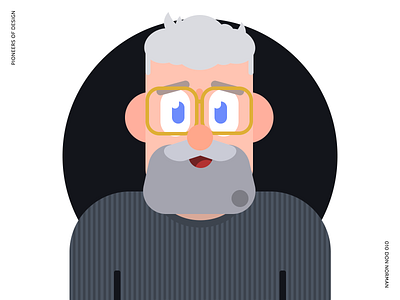Don Norman
“Good design is actually a lot harder to notice than poor design, in part because good designs fit our needs so well that the design is invisible, serving us without drawing attention to itself. Bad design, on the other hand, screams out its inadequacies, making itself very noticeable.” - The Design of Everyday Things
Don is a pioneer of user-centered design. He took the term affordance (Gibson, 1966) and placed it in the realm of human-computer interaction to refer to action possibilities that are readily perceivable by an actor. This concept is not only dependent on the physical capabilities of the actor, but also their goals, beliefs, and past experiences. Norman’s affordance “suggests” how an object may be interacted with.
Don Norman is Distinguished Professor (emeritus) and Founding Director (emeritus) of the Design Lab at the University of California, San Diego. He is co-founder, emeritus, of the Nielsen Norman Group, former Vice President of Apple, and former executive at Hewlett Packard. Norman serves as an honorary professor of Design and Innovation at Tongji University (Shanghai), and is an advisor or board member of numerous companies.
He is well known for his many books:
The Design of Everyday Things: Revised and expanded (2013)
Living with Complexity (2010)
The Design of Future Things (2007)
Emotional Design: Why We Love (or Hate) Everyday Things (2005)
The Invisible Computer: Why Good Products Can Fail, the Personal Computer is So Complex, and Information Appliances Are the Solution (1998)
Turn Signals Are the Facial Expressions of Automobiles (1993)
Things That Make Us Smart: Defending Human Attributes In The Age of The Machine (1993)
The Psychology of Everyday Things (1988)
He lives at www.jnd.org.

